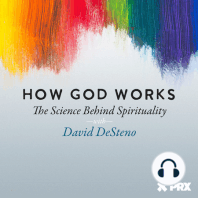35 min listen

How to be a Great Ancestor
How to be a Great Ancestor
ratings:
Length:
36 minutes
Released:
Feb 5, 2023
Format:
Podcast episode
Description
What do we owe future humans? In principle, it seems obvious that we should do what we can to make life better for the generations that follow, just as our ancestors did for us. But while most of us agree that doing this is the right thing, it can be hard to put into practice while also avoiding some of the pitfalls that often afflict growing philosophies like effective altruism and longtermism.
Join Dave as he speaks to Harvard psychologist and philosopher Joshua Greene about what drives our moral instincts, and to futurist Ari Wallach about how tapping into spirituality and emotion can help us become better ancestors to those yet to be born.
Find out more about Joshua Greene’s work, including how to buy his book Moral Tribes: Emotion, Reason, and the Gap Between Us and Them, on his website. Also, check out Giving Multiplier, a donation system Josh co-created based on research about how to improve charitable giving decisions.
Ari Wallach is the author of Longpath: Becoming the Great Ancestors Our Future Needs. Find out about the book and Longpath in general here. You can also read Ari’s article for Wired about addressing short-termism, or watch his TED talk.
Other interesting readings on the topic for this episode: The Big Thing Effective Altruism (Still) Gets Right, by Ezra Klein for the New York Times, and Effective altruism gave rise to Sam Bankman-Fried. Now it’s facing a moral reckoning, by Sigal Samuel for Vox.
Join Dave as he speaks to Harvard psychologist and philosopher Joshua Greene about what drives our moral instincts, and to futurist Ari Wallach about how tapping into spirituality and emotion can help us become better ancestors to those yet to be born.
Find out more about Joshua Greene’s work, including how to buy his book Moral Tribes: Emotion, Reason, and the Gap Between Us and Them, on his website. Also, check out Giving Multiplier, a donation system Josh co-created based on research about how to improve charitable giving decisions.
Ari Wallach is the author of Longpath: Becoming the Great Ancestors Our Future Needs. Find out about the book and Longpath in general here. You can also read Ari’s article for Wired about addressing short-termism, or watch his TED talk.
Other interesting readings on the topic for this episode: The Big Thing Effective Altruism (Still) Gets Right, by Ezra Klein for the New York Times, and Effective altruism gave rise to Sam Bankman-Fried. Now it’s facing a moral reckoning, by Sigal Samuel for Vox.
Released:
Feb 5, 2023
Format:
Podcast episode
Titles in the series (58)
Contemplating Death: A Secret for Happiness: COVID-19 has led to what’s being called The Great Resignation. People are leaving their jobs in record numbers, many to find more meaning in life or to spend more time with family and friends. As it turns out, realizing that death might not be as far off as it usually seems just might have something to do with that. by How God Works: The Science Behind Spirituality